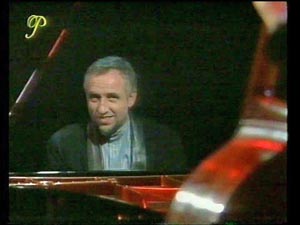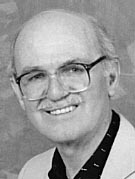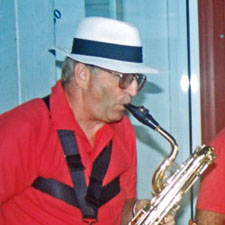1. Use your own composition
 This is what for example the French pianist Jacques Lousier has done.
He has worked out one improvisation for each piece he plays, then
plays it again and again, note for note, at every performance (either
from a written transcription or from memory).
This is what for example the French pianist Jacques Lousier has done.
He has worked out one improvisation for each piece he plays, then
plays it again and again, note for note, at every performance (either
from a written transcription or from memory).
There is something to
say for this approach when you are a star performer and you
have to deliver the goods each and every time, but I personally find
it most disappointing. It goes against the spirit and intention of
what Jazz is all about.
I had been listening to Lousier's records
for years, then 10 or 15 years later I went to one of his live
performances in Canberra. He still played every solo exactly the same
as on the records we had from him.
2. Improvise following a set series of
ideas
This is an interesting idea promoted by the American saxophonist and
educator David Liebman.
I became familiar with this
approach at a private lesson from one of Liebman's students. You take
a blank piece of manuscript paper and write down a series of cameo
ideas at appropriate points of the song's chorus.
The idea maybe
only one bar in length and can be the start of a phrase, an arpeggio,
the beginning of a digital pattern, etc. You may have just one idea
for an entire chorus, then another one if you are soloing over a
second chorus. Or you may have different ideas at shorter
intervals, say every 8 or 16 bars.
The ideas may not even be all your
own either. You may listen to a record or performance by someone else
and think "Hey, that is a great idea. I am going
to try that too." This happens a lot in Jazz, and is an
important mechanism through which it develops an ever expanding
vocabulary.
This approach is clearly a good one for quality professional
performers. They have their set combination of ideas for a song,
ensuring a good standard of performance, while at the same time they
can discard it at any instant during their solo if they find they are suddenly on a roll with
something new.
3. Have the first phrase in your mind before
you start
 This is what the well known Australian former ABC arranger, composer
and pianist Eric Bryce told me he always does. He mainly does
it for the very first song of his performance, just to get off on a
good start. Once that is accomplished he is right for the
session.
This is what the well known Australian former ABC arranger, composer
and pianist Eric Bryce told me he always does. He mainly does
it for the very first song of his performance, just to get off on a
good start. Once that is accomplished he is right for the
session.
This is more a psychology thing than anything else.
Curiously, exactly the same happens when playing contract bridge (or any other sport I imagine). If
the first game you play goes well you are right for the evening. But
if you make a big mistake, it takes a hell of a long time before you
get
back on track.
4. Let the mood of the moment inspire
you
 This is total freedom and of course a lot of fun. The band or backing
track, the song itself and the audience (if there is one) set you in a certain mind
frame which propels you into your solo. If you play different
instruments then the one you play and the technical skill you have
over it are also most important.
This is total freedom and of course a lot of fun. The band or backing
track, the song itself and the audience (if there is one) set you in a certain mind
frame which propels you into your solo. If you play different
instruments then the one you play and the technical skill you have
over it are also most important.
But be aware, starting an
improvised solo is like standing at a road intersection. Which
way are you going, North, East, South or West ? The first couple of
steps will determine your direction. Likewise the first two or
three notes will set the direction and course of your
solo.
|


